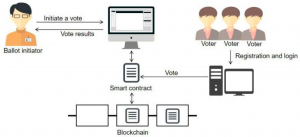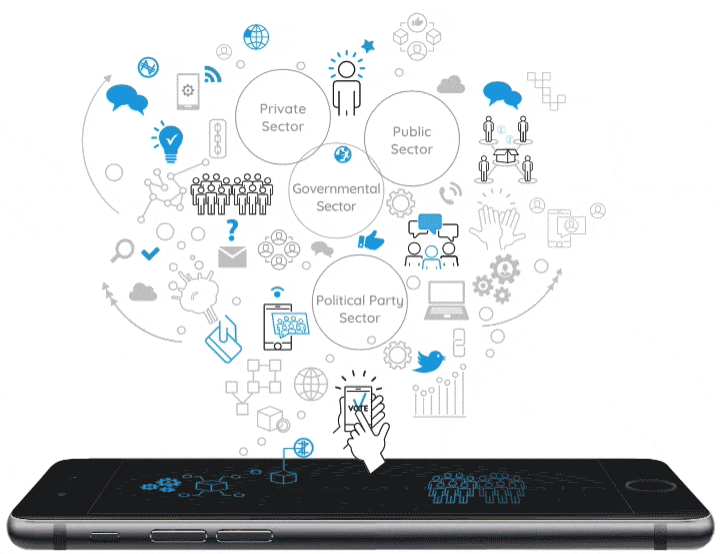
Democracy has turned into a mockery for some countries. On one side, the so-called governments their public they have the ability to “run” the nation, and then again, they need to stand hours in line to get their representatives elected. How’s more regrettable is even in the wake of treating this battle, the greater part of the countries actually has questions about vote controls.

It merits seeing that a voting framework exists at all levels from choosing the head boy of the school to choosing the Prime minister who runs a nation. Nonetheless, since the most refined (moderately) voting framework is performed at the public level, we can have a fair thought of what the remainder of the nation would confront on the off chance that the Tier-1 authority can’t ensure straightforward democracy to its public.
The idea of decentralization has been around for quite a long time; in any case, its most strong application turns out to be as blockchain innovation. In spite of that, after numerous long stretches of the send-off of Bitcoin, the majority actually believe that blockchain innovation just has monetary use cases.
In any case, as more individuals took on it, basically when Ethereum and other Enterprise-Grade blockchains surfaced the market, everybody understood the huge potential and the degree of adaptability presented by this innovation.
In 2012 when a couple of Canadian researchers had a go at using the inborn properties of the Bitcoin organization to perform “scientifically measuring” in a computerized climate and use it to follow the provenance of data – the point was to reinforce or all things being equal “sustain” the design of e-casting a voting framework.
The primary strategy determined by the two researchers in such a manner was called CommitCoin. It permitted them to guarantee everybody’s votes security and make it permanent for anybody subsequent to getting communicated.
Blockchain innovation comprises a solitary commonly settled-upon record of exchanges shared by a great many hubs. To roll out any improvement to the current information on the organization, the programmer or any fraudster would have to have an agreement, which infers “constraining” 51% of the absolute hubs to default all the while. Since it is basically and computationally (exceptionally difficult) to do, the likelihood of a record getting changed stands close to nothing. This trademark is presumably the most commended property of this innovation that makes it appropriate for casting a voting framework.
#A Decentralized Database
They are brought together information bases for putting away citizens’ certifications in conventional frameworks, and the counts of votes are additionally put away on such centralized models. In this way, they are inclined to online protection protocols. In the event of any threat by any act of hacking one server crashing will lead to the breakdown of the whole system, Bu the, blockchain-based frameworks are absolutely decentralized. Regardless of whether a programmer compromises one node, he would need to acquire a larger part to cut down the network.
#Biometric Verification
Probably the gravest concern looked at in basically completely centralized designs, casting voting specifically, is data fraud. Any digitally empowered individual could take anybody’s ID record and vote for his benefit. Blockchain innovation requests the ID of a client be checked before he can make a move on the framework to forestall the passing of an individual ID record.
We should also note that biometric check is somewhat quick in such a manner. There are different techniques, for example, passwords and OTPs, that cutting-edge applications often use. It is likewise worth seeing that most blockchain-based frameworks currently request KYC checks for every person who registers on the stage. A similar idea can be applied to an elector also, subsequently expanding the framework’s general security.
#Security
Aside from the standard security rehearses adhered to blockchain-based voting frameworks, it is fundamental to talk about the security benefits.
Elliptic Curve Cryptography (ECC) is at the bleeding edge of blockchain’s high-grade security. Assume we comprehend it absolutely according to the democratic viewpoint. All things considered; it suggests that every citizen will have two extraordinary keys on the organization that is made by means of codes when their records are made. While one of the related keys is presented to people as proof, the private key stays stowed away from everybody and is fundamentally utilized by the record proprietor just to confirm his personality and other chores, as and when required.
The private key can likewise be viewed as his mark in the cryptographic circle and can be frequently used for other purposes.
#Transparency
Anything can be corrupted to some degree or “persuaded” to break down into the conventional world, let it be a machine or a person. This potential issue renders them dicey when most touchy use cases, like voting, are dealt. With the assistance of blockchain’s provenance, we can generally count the votes progressively and stand on a political decision result sometime in the not-too-distant future with zero traces of uncertainty about its authenticity. Every time there is a survey about people’s choices, online voting wins the race because of the growing trust on online world ranging from banking to grocery. Things with ECC have always been different for the matter of trust over transparency and secrecy at the same time.

Authentication
At this point, we have a modest bunch of new companies working in the blockchain space to alter voting. Before we begin investigating these endeavors, it is worth focusing on that a few state-run administrations have additionally begun utilizing this innovation to change their “uncovered” casting a ballot component. For example, the Thai Democrat Party coordinated a political race for its party head in 2018 and they utilized the ZCoin organization. This occasion was a seriously significant accomplishment for blockchain circles as it turned out to be the principal event or rather execution of the blockchain innovation at such a monstrous scope as the whole nation contributed 127,479 votes through the new framework
#Horizon State
They offer truly outstanding and most exhaustive solutions for states, committees, partnerships, ideological groups, distributers, leaser casting a vote, bartering arrangements, and much more. To give the conventional democratic arrangement, they offer an advanced polling station that isn’t just exceptionally scrambled yet saves a large number of dollars over the long haul for associations and countries.
Do you wish to own a start-up that works to incorporate that works for the future while earning the numbers? Connect with BizBrolly, one of the top mobile app development companies known for their premium services in mobile apps and IoT technologies.